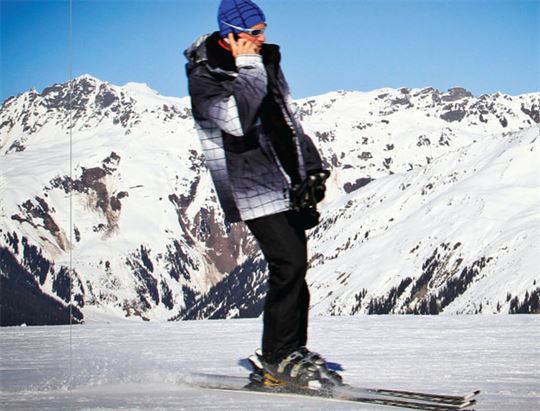By George Koch in Fall 2013 issue
The Blackcomb groomer was chock-a-block with the usual peak-Christmas-holiday rainbow of skiing and boarding styles, velocities and attentiveness, and I was applying all my collision-avoidance tactics. Suddenly far down the run a brightly clad skier shot out of the woods airborne, landing on the hard surface and traversing straight across. Those nearest him launched into hard swerves and wild skids as he continued across blissfully oblivious. As I drew closer I noticed that his giant floppy tuque kept tipping forward, and that he was hunched and looking downward. Downward. At his palm. Which was holding something. I realized then, dude was texting. He’d hurtled out of the woods and crossed a jam-packed run without once turning his head. As he drew close to the trees on the other side, he finally skidded to a halt and shook his head in befuddlement as he rejoined reality.
The world is awash in stories of people texting (or yakking) while driving, jaywalking, shopping, dining, nursing infants, operating machinery or in a meeting with the boss. But this was a new one for me. Just avoiding the eight or so near-pileups was a minor miracle. As if the ranks of guardian angels who look over stupid youths, drunks and fools had been joined by a texting angel. But then why not just text down to Earth, “Look uphill, you moron?”
Aside from triggering the standard head-shaking, it did make me wonder: If this is how you spend your time on the mountain, why ski or snowboard at all? What’s the point of the experience, if you hardly experience it? If you divert your main sense—sight—plus most of your brainpower away from the act of skiing, you’re tuning out what’s supposed to be the good part: skiing. Unlike bus rides or doctor’s office waits, you’re not supposed to need diversion from skiing. You do it voluntarily, ’cause it’s fun. But texting-boy and others like him shut themselves off from all that, including the sheer joy of being alive in a glorious setting on an incredible day. What ever happened to living in the moment, as opposed to planning the next moment or gloating over the previous one?
Although Mr. Floppyhat was an extreme example, for so many other people I see nowadays, it’s also no longer about “just sending a quick text.” Letting gadgetry divert their attention from something innately enjoyable has become habitual. It’s obsessive behaviour that shares symptoms with addiction. Many people nowadays just can’t seem to sit still, or stand their own company, so like the cigarettes of past generations or pacifiers for grownups, today the digital devices fly out as soon as people skid into the lift line.
I’ve had uncountable recent lift rides during which other riders peer intently at their palms, thumbing and tapping maniacally, never once looking up at the Rocky Mountains in all their splendour, or scoping out the terrain for some untracked fresh. Hey, they loved the photos and video when they were planning the trip. No need to look at the real thing.
Then there is the influence of inflated postmodern narcissism. Ski Canada editor Iain thinks much of this behaviour is motivated simply by the need to boast, to prove to one’s vast network of Facebook “barely friends” that you’re one totally jacked dude who’s always on the scene and doing things that others ought to envy. Don’t you wish you were with me, or better yet, that you were me?
As the satirical fly-fishing guide Hank Patterson proclaims in a slightly different context, “That’s what fishin’s all about, lettin’ other guys who aren’t catchin’ fish know that you are catchin’ fish.”
The proliferation of GoPro cameras Velcroed to helmets or ski tips provides further evidence of that. Last season at Whistler my buddy Kevin Damaskie spotted a guy with two GoPros. He was looking down at his ski tips, prompting Kevin to proclaim, “That guy is filming himself filming himself.”
The behaviour can take on an almost metaphysical or existential dimension. It’s hardly radical to say that communications technology alters our perceptions not only of what matters, but of what is real. As each generation becomes dominated by a new technology, events are rendered significant only to the extent that they are conveyed through that era’s principal medium. Half a century ago, the authority of print gave way to the perception that if it wasn’t on TV, it didn’t quite happen.
Today’s mélange of cell cameras, consumer video, texting and social media provide near-instant and self-performed communications channels that reach far beyond TV. Form and substance can become confused and eventually trade places. Action, events and experience in the formerly real world are subordinated to the electronic reporting thereof—and so are the people themselves. If you’re not on Facebook, do you really exist?
One day last season at Lake Louise I’d just completed an epic powder descent of a just-opened Whitehorn 2. I passed several younger, fitter guys who, instead of racing down the run-out for another lap, had whipped out their cell phones and were taking faraway photos for instant sharing. Transforming their physical experience into something recognizably real, i.e., digital, was far more important to them than another run before the powder was trashed.




